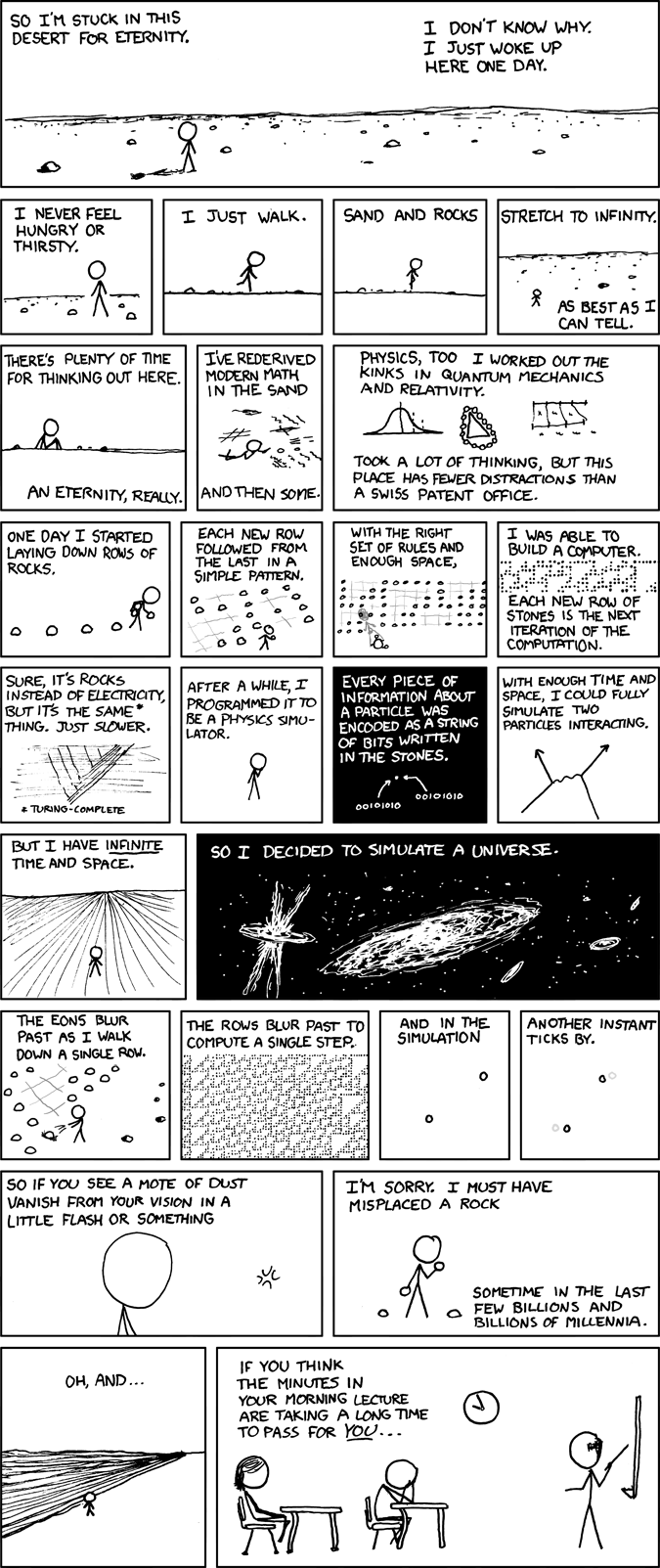I often find thinking about various metaphysical problems in terms of Turing machines is an extremely powerful tool, particularly the problem of consciousness. I was inspired a few moments ago by this xkcd comic (one of my favourites): |
|
Results 1 to 4 of 4
Hybrid View
-
12-08-2009 03:54 PM #1Banned


- Join Date
- Aug 2005
- Posts
- 9,984
- Likes
- 3084
Time, Reality, and Turing Machines
-
12-08-2009 04:26 PM #2
This is way too deep to be thinking about in a sleep-deprived state but I'll give it a go.
I would say for a simulated person, the flow of time appears to remain constant, even if the simulation is sped up, slowed, halted, or even reversed, as long as everything related to the simulation was scaled by the same factor.
The mechanism by which time is perceived is modified by the same factor as the simulation, so the reference point appears unchanging. For example, if you double the speed, a simulated watch runs twice as fast, and the person's neuronal activity proceeds twice as fast, and events proceed twice as fast, so there's no noticeable difference.
Now if we sped up the person's simulated brain whilst leaving other aspects of the simulation unchanged, time would appear to proceed more slowly, since more thought occurs between events, and analysis can be performed at a higher resolution of time.
The rate at which time proceeds in the simulation and the "real" timeframe are unconnected. The simulated timeline can flow both ways at any speed within the limits of computation. Reality is fixed in one direction at a single speed.how does the rate of passage of time in the simulation correspond to the actual rate of passage of time of the 'real' Turing machine?
By reference to the flow of simulated events, and the rate at which the mechanism for the perception of time works at.But then, what determines their rate of time? Where does it come from?
-
12-08-2009 04:27 PM #3
If it takes 1000 years to caculate 1 year, then their rate of time will be exactly, 1000 times slower.. 1 second for us will be 1 millisecond for them.
Anyway, cool strip.. maybe the guy in the desert was God? One day humanity will also create a simulation of the universe, who says a previous civilization hasn't done it before us? If time is infinite, then the amount of time already past must also be infinite, making the possibility of this already having happened.. 100%. If you have infinte time to roll a dice, the probabilit y of rolling a 6 is 100%"Reject common sense to make the impossible possible." -Kamina
-
12-08-2009 06:47 PM #4
I thought about this when I first heard that human beings could someday enhance their intelligence with bio or nanotech. Using either method we could speed up our rates of thoughts, but then I wondered if we would perceive them as faster, or if they would seem the same to us, but faster relative to the external world. I think my original thought was, would we feel like we are reacting faster, or would it just feel like time slowed down? And then I wondered how this innovation would change our relationships with each other. Add virtual reality and then it would become more efficient to operate in the virtual world than reality, because of physical limitations that wouldn't exist in the virtual world. Of course being the lazy person I am I thought about how you could have extended vacations, one day lasting a month, etc.




 LinkBack URL
LinkBack URL About LinkBacks
About LinkBacks





 Reply With Quote
Reply With Quote


Bookmarks